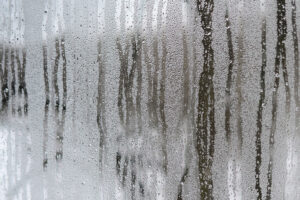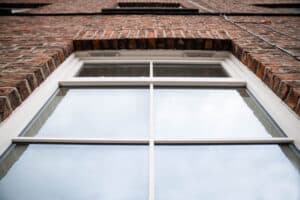Caring For Your Double-Glazed Windows Over the Winter
You really feel the benefit of double glazing during the winter months, as it reduces the amount of heat that escapes from your home, keeping the property warmer for longer. The cold weather can cause some issues with your windows, mostly in the form of condensation forming on the panes, which can lead to increased humidity in the home. Fortunately, this is easily resolved with a few simple tricks.
In this article, we’re going to look at some hints and tips to minimise the impact of winter condensation and help you keep your double-glazed windows in peak condition.

What Is Condensation?
Simply put, condensation occurs when warm air hits a cold surface, such as your window glass. The warm air releases its heat energy into the glass, causing any vapour in the air to revert to a liquid state, leaving droplets of water on the window pane. The more moisture in the air, the more condensation is left on your glass. During the winter, the air inside the home is often more humid, as we take hotter and longer showers, operate the tumble dryer more frequently, cook more hot and steaming meals, and keep our doors and windows firmly shut to keep in the warmth. All those factors, combined with the drastic temperature change between the inside and outside of the property, mean more condensation in the winter than during the summer.
Wipe Down Your Windows
Condensation won’t damage your windows if you have uPVC or aluminium frames, but it can cause damage to wooden frames, particularly if they haven’t been properly treated. The easiest way to avoid this is to wipe down your windows with a dry microfiber cloth to remove any excess moisture. Once a day, first thing in the morning is usually enough, unless you are experiencing particularly high levels of condensation.

Ventilation
Proper ventilation can help some of the humid internal air escape, reducing the risk of condensation. Of course, this isn’t always possible during the winter months when even a slight opening for ventilation will let out all your heat. Most modern double-glazed units incorporate trickle vents that let out the worst of the condensation. If your model doesn’t have these, it may be worth investing in a new set of windows.

Condensation Inside the Glass
Sometimes you will notice condensation has built up between the panes in your double-glazed units. This is normally a sign that the seal has deteriorated or that the windows were poorly fitted at the outset. Either way, it means that your windows are not providing the insulation that they should for your home and ought to be replaced.
Get in touch
If your double-glazed windows are misted on the inside or if you want more energy-efficient windows for your home, now might be the time to get them replaced. For fast and effective double glazing installations across the North West, contact Wirral Double Glazing, by Thextons today. Call us on 0151 608 2278 for a free consultation with our experts.





